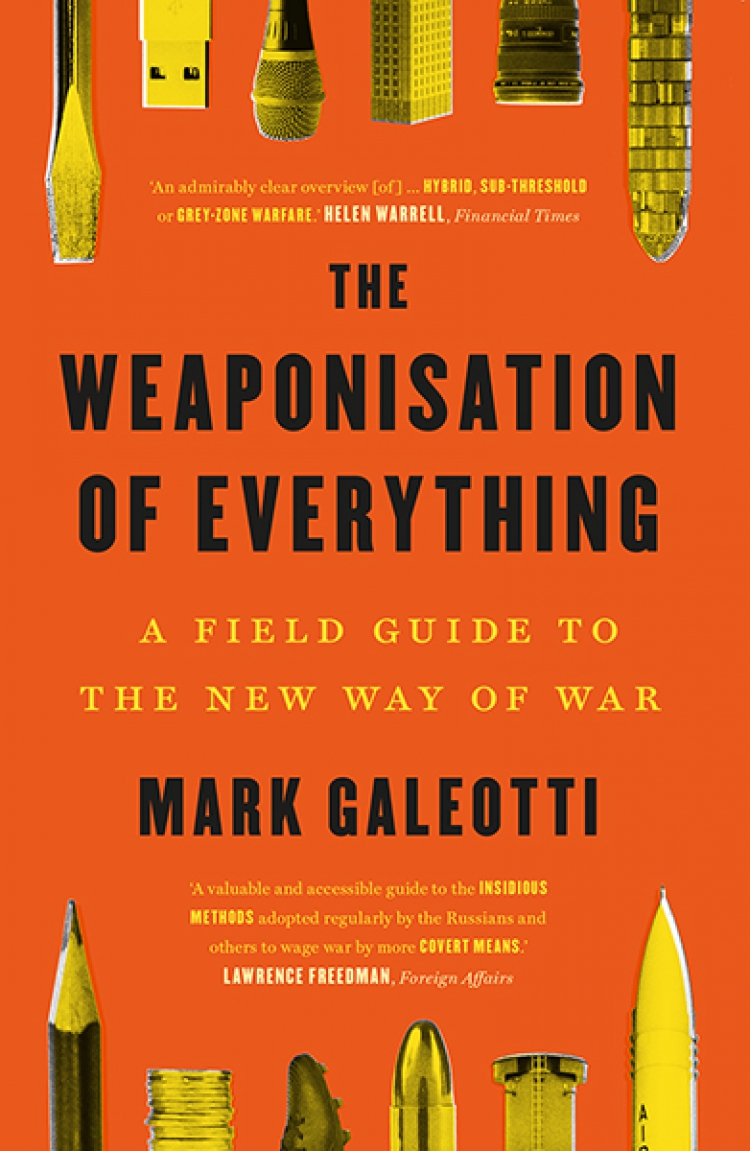
|
The Weaponisation of EverythingMark Galeotti |
When Iraq invaded Kuwait...
Scaling up, when Iraq invaded Kuwait and neighbours such as Saudi Arabia and the UAE feared they might be next, they were happy to see the US-led multinational coalition deal with the problem. Doubly so, as many of these countries either lacked the forces to make substantial contribution or - as in Saudi Arabia’s case - the desire to do any fighting. So instead the stumped up direct payments of $84 billion to the US, Britain and France, who did the lion’s share of the fighting, and extra support to cover bases and logistics. No one would suggest that the combatant countries actually made a profit on the war, or that they were motivated by the payments. Nonetheless, the way that rich but militarily weak of self-indulgent nations could simply outsource the violence - and the dying - to foreigners is a pattern that Macchiavelli would have recognised from the days when mercenary captains fought Italian city-states’ wars for them.
The UN pays a flat fee of around $1,500 per soldier per month...
The UN pays a flat fee of around $1,500 per soldier per month, but to the state providing the force, not the individual grund on the ground. That would not cover the basic pay and provisions of a British Army private but compares very favourably with an Ethiopian average salary of $275 per month, and the government can pocket the difference between what the UN provides and what it pays its men.
Soldiers can be drafted into all kinds of other roles in the name of security...
Soldiers can be drafted into all kinds of other roles in the name of security - and for the same reason, all kinds of other institutions and individuals can be deployed to ‘do security’.
Once, generals could accept the deaths...
Once, generals could accept the deaths of thousands in a single day’s carnage with, if not equuanimity, a conviction that this was what war mean. (While, as Lord Wellington is meant to have said when one of his artillery men had sight of Napoleon at Waterloo, ‘it is not the business of commanders to be firing upon one another’.) Now, things are different.
Offensives can as easily be launched...
Offensives can as easily be launched from a newsromm or a boardroom as a cabinet warroom. Your ‘soldiers’ may not carry your passport; they may not even know they are in a war, or on whose side they are fighting.
In the shadow of the Nazi concentration camps...
In the shadow of the Nazi concentration camps, of 75 million dead and of the atomic mushroom clud, the United Nations was conceived, in the words of Dag Hammarsköld, its second secretary general, ‘not to lead mankind into heaven but to save humanity from hell’.
Besides, for the US in particular...
Besides, for the US in particular, when the 9/11 attacks generated a sudden and irresistable demand for intelligende support for the ‘War on Terror’, this was the only way an intelligence community that had suffered a decade of contraction could respond rapidly. You cannot train officers to speak Farsi or pivot them from Kyiv to Kabul overnight, but you can hope to hire that existing expertise. Short-term response become long-term dependency, though: as a 2007 presentation from the Office of the Director of National Intelligence put it, ‘We can’t spy … if we wan’t buy!’
Suddenly, everything can be weaponised...
Suddenly, everything can be weaponised as part of the expanding array (arsenal, even) of military metaphors all around us. The irony is that just as the language of real war is becoming blandly euphemistic (with ‘delivery systems’ causing ‘collateral damage’), civilian speech becomes more martial. Beyong the ‘War on Drugs’ and the ‘Battle Against COVID’ (British prime minister Boris Johnson even hailed news of vaccines as proof that the ‘scientific cavalry’ were ‘coming over the brow of the hill’), everything now seems couched in military terminology. In part this may reflect the new age in which a terrorist’s bomb or a rival’s sanctions could hit anyone, any time, leaving us feeling like reluctant conscripts on an invisible battlefield.
Close allies compete viciously...
Close allies compete viciously for trade deals and a technological edge, for precedence and prestige. If now we have no real enemies, the sad corollary is that we have no real friends, either.
A Swiss Army knife is a very fine instrument ideed...
A Swiss Army knife is a very fine instrument indeed, but if you insist on adding more and more tools to it, and take out the knife to make room for, say a bonsai rake and a magnifying glass, arguably you miss the point. Often it is better to use a different gadget, one specifically dedigned for the job, and not ruin your Swiss Army knife at the same time.
Even the UN hire private security companies...
Even the UN hire private security companies to protect its missions. In1994, when the genocide was being practised with murderous abandon in Rwanda and no governments seemed inclined to step in, the UN’s then-Undersecretary-General for Peacekeeping, Kofi Annan, considered hiring one of the biggest, DSL, to intervene. He ultimately ung back, saying that ‘the world may not be ready to privatise peace’, but it certainly seems to be willing again to privatise war.